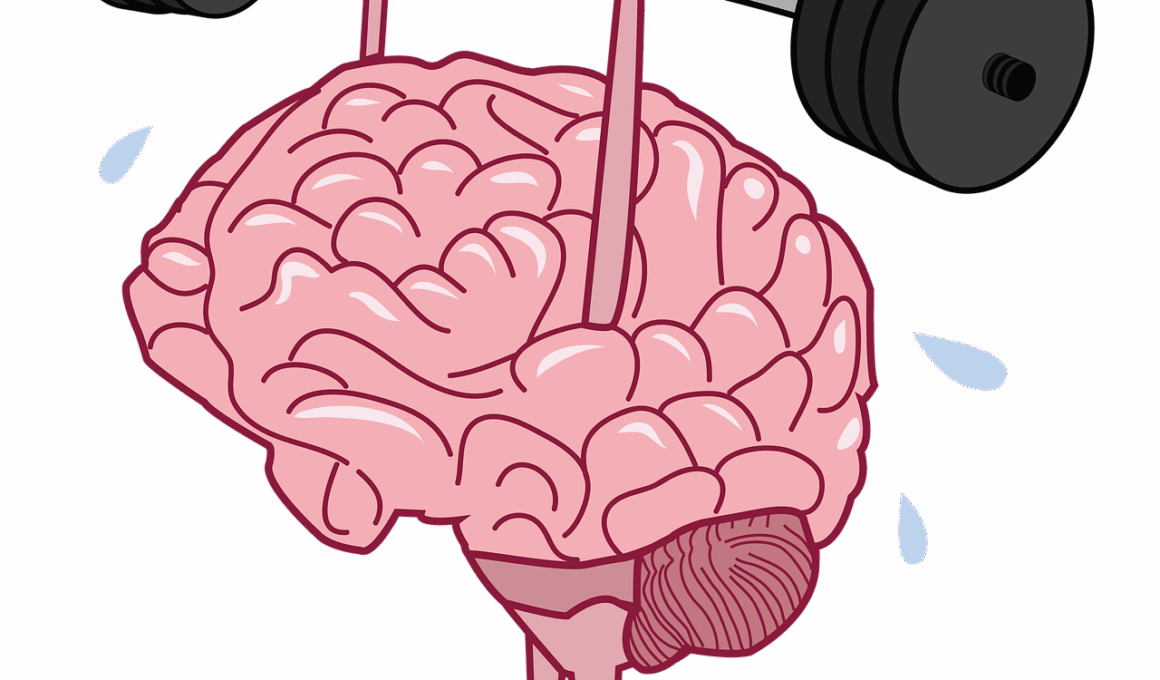Incorporating Weights Into Therapy for Mental Health Treatment
Strength training is increasingly recognized as an effective complementary approach to traditional mental health therapies. By incorporating weightlifting into treatment, individuals can experience significant improvements in mood and motivation. Strength training helps activate the body’s endorphins, which are natural mood lifters. This form of exercise also boosts self-esteem as individuals achieve their fitness goals, often leading to a reduction in anxiety and depression symptoms. Moreover, learning new skills through weightlifting can foster resilience and a strong sense of accomplishment. Both body and mind benefit, demonstrating the holistic impact of physical fitness on emotional well-being. Furthermore, weight training can establish routine and structure, essential elements for individuals managing mental health disorders. In this setting, the gym becomes a safe space where individuals can focus on their healing journey. By combining strength training with counseling and other therapeutic modalities, fitness professionals and therapists can create comprehensive treatment plans tailored to their clients’ needs. Over time, these benefits contribute to improved mental health, providing individuals with tools to navigate life’s challenges. Strength training thus stands as a valuable asset in the ongoing fight against mental health issues.
The Science Behind Strength Training and Mental Health
Research has shown that engaging in regular strength training can significantly impact mental health. The psychological benefits are attributed to various factors, including the release of endorphins and the improvement of physical health. Strength training enhances overall body composition, leading to better fitness levels and increased energy. This often translates to mood elevation, allowing individuals to combat feelings of lethargy and hopelessness. Exercise can also serve as a distraction from negative thoughts and stressors. Focusing on the workout allows the mind to rest, creating a therapeutic gap. The structured environment of a gym also offers predictability, which can be comforting for people facing mental disorders. Additionally, social interactions occur naturally within gym environments, providing essential connections that combat isolation. These interactions can further bolster confidence and lead to a support network. Studies have indicated that strength training can mitigate anxiety and depressive symptoms, making it an invaluable part of a balanced treatment plan. The integration of weights into mental health regimes can therefore be a game changer. Clients should be encouraged to embrace this robust tool on their path to recovery, enhancing their overall therapeutic experience.
While exploring weight training, it is crucial to approach the practice mindfully. Understanding individual limits and gradually increasing weights is essential for both safety and effectiveness. Creating a personalized workout plan that considers the client’s unique goals and challenges will foster motivation and ensure sustainability. Moreover, consistency is vital in seeing significant mental health improvements over time. Regular sessions can establish a powerful link between fitness and mental resilience. Incorporating mindfulness into workouts can further enhance the benefits. Focusing on breathing techniques and being present during exercises allows individuals to connect their physical and mental states more deeply. Additionally, educators in mental health can promote the seven essential components of a balanced fitness routine. These components include strength training, cardiovascular exercises, flexibility, balance, nutrition, sleep hygiene, and mindfulness practices. Awareness of these interconnected elements will provide participants with comprehensive knowledge for well-rounded health in their therapeutic journeys. Tailoring feedback and support during sessions will maximize effectiveness, fostering an environment in which mental health can flourish. With commitment and effort, individuals can gain more than just physical improvements; they can achieve overall well-being as part of their recovery.
Setting Realistic Goals and Tracking Progress
Setting realistic goals is paramount when integrating strength training into mental health treatment. Clear, achievable goals such as lifting specific weights or completing certain repetitions can instill a sense of purpose and direction. Clients should be encouraged to track their progress consistently. Keeping a fitness journal can serve multiple purposes, from documenting achievements to reflecting on emotional changes throughout the process. Additionally, sharing progress with a therapist or trainer adds an accountability factor, which can enhance motivation. Regular feedback from professionals builds trust and provides clients with necessary encouragement and guidance. Tracking not only relates to physical accomplishments but also involves noting changes in mental well-being. For example, improvements in mood, energy levels, or interpersonal relationships can signify progress beyond mere numerical values. Utilizing technology such as fitness apps can also support initial progress checking. These tools collect data, providing visual representations of performance and achievements over time. When clients recognize their growth, both physically and mentally, it reinforces their commitment and belief in their capabilities. Thus, effective goal setting significantly influences the overall outcome of incorporating weights into therapy and establishing long-term mental health strategies.
Moreover, individuals experiencing mental health challenges often face unique hurdles that strength training can help address. Exercise not only benefits physical health but also aids in cognitive function. Strength training improves focus and reduces symptoms of Attention Deficit Hyperactivity Disorder (ADHD), offering a holistic approach to therapy. As individuals grow stronger, their sense of control and discipline also tends to improve, countering the impulsivity that often accompanies mental health disorders. The focus required during strength training can cultivate patience, a precious skill for those managing anxiety and impulse control issues. By concentrating on physical form and movement, participants learn to channel their energy in constructive ways, instead of succumbing to negative emotions. This adaptability is essential for developing emotional intelligence and resilience in coping with life’s challenges. Additionally, the ancient practice of strength and resistance training can instill a deeper sense of tradition and purpose. Clients may find strength training reflective of personal growth and transformation, symbolizing their journey towards mental clarity and stability. As such, incorporating weights into therapy promotes an enduring journey toward comprehensive well-being that honors individuals’ personal struggles.
Choosing the Right Environment for Strength Training
The environment in which strength training occurs plays a pivotal role in its effectiveness for mental health treatment. A safe, supportive, and welcoming atmosphere enhances the overall experience and outcomes. Choosing the right facility can be essential for individuals who may be self-conscious or new to fitness training. A gym that encourages inclusivity and offers a variety of options caters to different preferences and levels of experience. Moreover, personal trainers with an understanding of mental health can help tailor workouts, ensuring comfort and encouragement throughout the process. Motivation can flourish in environments with camaraderie and support from trainers and peers alike. Outdoor settings also provide a refreshing change, immersing individuals in nature’s calming elements. Research has shown that exercising outdoors can further enhance mood and reduce stress levels. Natural light and fresh air can have profound effects on mental health, amplifying the benefits of physical activity. Clients should explore various spaces until they find the one that resonates positively with their emotional states. Ultimately, choosing the right environment fosters a successful alignment of strength training and mental health improvement.
Finally, it is essential to acknowledge potential barriers clients may face while engaging in strength training for mental health purposes. Physical limitations, past injuries, or feelings of inadequacy can create significant obstacles. These issues can be addressed through open discussions between clients and their therapists or trainers. By acknowledging these barriers, together, they can devise strategies to support clients more effectively. Adaptive strength training programs can be designed to accommodate physical conditions or emotional barriers, ensuring inclusivity. Encouragement is vital in helping clients overcome these challenges. Celebrating even the smallest achievements, using positive reinforcement, and recognizing individual efforts fosters a culture of growth and progress. Therapeutic support should include strategies to reframe negative thoughts that may arise within clients regarding their bodies and abilities. This mindset shift can empower individuals to view challenges as opportunities for growth, leading to increased resilience against setbacks. It is important to reinforce that strength training is a journey and not a race, allowing individuals to embrace their unique paths. In conclusion, incorporating weights into therapy for mental health treatment is indeed a promising avenue for holistic healing and personal empowerment.
Conclusion: The Future of Strength Training in Mental Health Treatment
As the understanding of mental health continues to evolve, the integration of physical fitness, particularly strength training, stands at the forefront of innovative therapeutic practices. The potential for strength training to enhance mental health is immense, providing individuals with not just an outlet for stress but also a means of empowerment. Looking forward, it is essential to foster collaborations between mental health professionals and fitness trainers, ensuring that holistic programs are accessible to those in need. This collaboration can create situations where clients feel supported mentally while pursuing their physical fitness goals. Strong partnerships can lead to continued research and recognition of strength training’s positive effects on mental health, encouraging more programs to be integrated into standard treatment approaches. Additionally, the growing acceptance of fitness as vital to mental health can contribute to reducing stigma surrounding both exercise and mental health issues. As more individuals embrace the connection between mind and body, we will likely witness a robust shift in how we conceptualize therapeutic benefits. By taking a proactive approach, individuals may ultimately find greater resilience and strength within themselves than they ever deemed possible.


